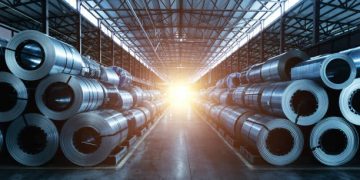June 3 – U.S. prices of steel and aluminium climbed on Monday, while shares of foreign steel producers declined after the U.S. administration announced an increase in tariffs on imports of the two metals to 50%, effective June 4.
The United States, which imported approximately 26.2 million tons of steel in 2024 excluding the European Union, is the world’s largest steel importer, according to the Department of Commerce.
Industry analysts noted that while implementation details remain to be confirmed, the announcement has created uncertainty and contributed to rising metal prices, potentially affecting industrial demand.
“Higher prices are also likely to weigh further on U.S. steel demand from the manufacturing sector, which we already expect to contract this year,” said Eoin Dinsmore of Goldman Sachs.
Premiums on U.S. physical aluminium jumped 54%, while hot rolled coil steel prices increased by 7.4%. Copper prices also moved higher on speculation that broader tariffs might be extended to additional industrial metals.
Some European and Asian steel producers expressed concern over potential disruptions to market access and pricing. Germany’s Salzgitter noted possible negative implications for European industry, with the U.S. accounting for roughly one-fifth of European steel exports outside the EU.
“The risk for the European market, as well as other regional markets, is that some of the trade flow could reroute,” said Deutsche Bank’s Bastian Synagowitz.
Despite initial reactions, some analysts believe the final impact of the tariffs may be moderated.
“I think the final result will be far lower than initially projected, especially concerning its duration,” said Chelsea Ye, senior analyst at McCloskey.
U.S. aluminium producers welcomed the move, stating it would help level the playing field against subsidized imports.
“For decades, subsidized foreign producers have hollowed out domestic aluminum manufacturing,” said Mark Duffy, president of the American Primary Aluminum Association.
Global Market Response:
Shares of steelmakers in South Korea, the fourth-largest exporter of steel to the U.S. last year, fell following the news. POSCO and Hyundai Steel each saw a decline of 3%, while SeAH Steel dropped 8%.
Vietnamese steel firms, including Hoa Sen Group, Nam Kim Steel, and Vietnam Steel Corp, also reported losses ranging between 2.7% and 3.4%.
A South Korean industry official noted that exporters are cautious about increasing shipments to the U.S., despite higher domestic steel prices there.
“It will be a burden to exporting companies if there are no additional steel price increases in the U.S.,” the official stated.
The 50% tariffs expand on earlier measures that imposed 25% duties on most steel and aluminium imports, implemented in March.
Trade Negotiations Ongoing:
South Korea has requested exemptions from the tariffs during discussions with the U.S. and is working toward a broader trade agreement. Talks have faced delays due to political transitions ahead of upcoming elections.
Meanwhile, in response to shifting trade dynamics, Hyundai Steel announced plans to invest $5.8 billion in a new factory in Louisiana, with operations expected to begin in 2029. POSCO has also signed a preliminary agreement to invest in the project.
In India, aluminium industry leaders raised concerns over the potential impact of the tariffs, given the country’s reliance on U.S. markets.
“This is going to have a detrimental impact,” said B.K. Bhatia, director-general at the Federation of Indian Mineral Industries.
“We are hopeful that with ongoing talks, the tariffs will come down.”
#SupplyChainNews #TariffUpdate #SteelMarket #AluminiumIndustry #GlobalTrade















